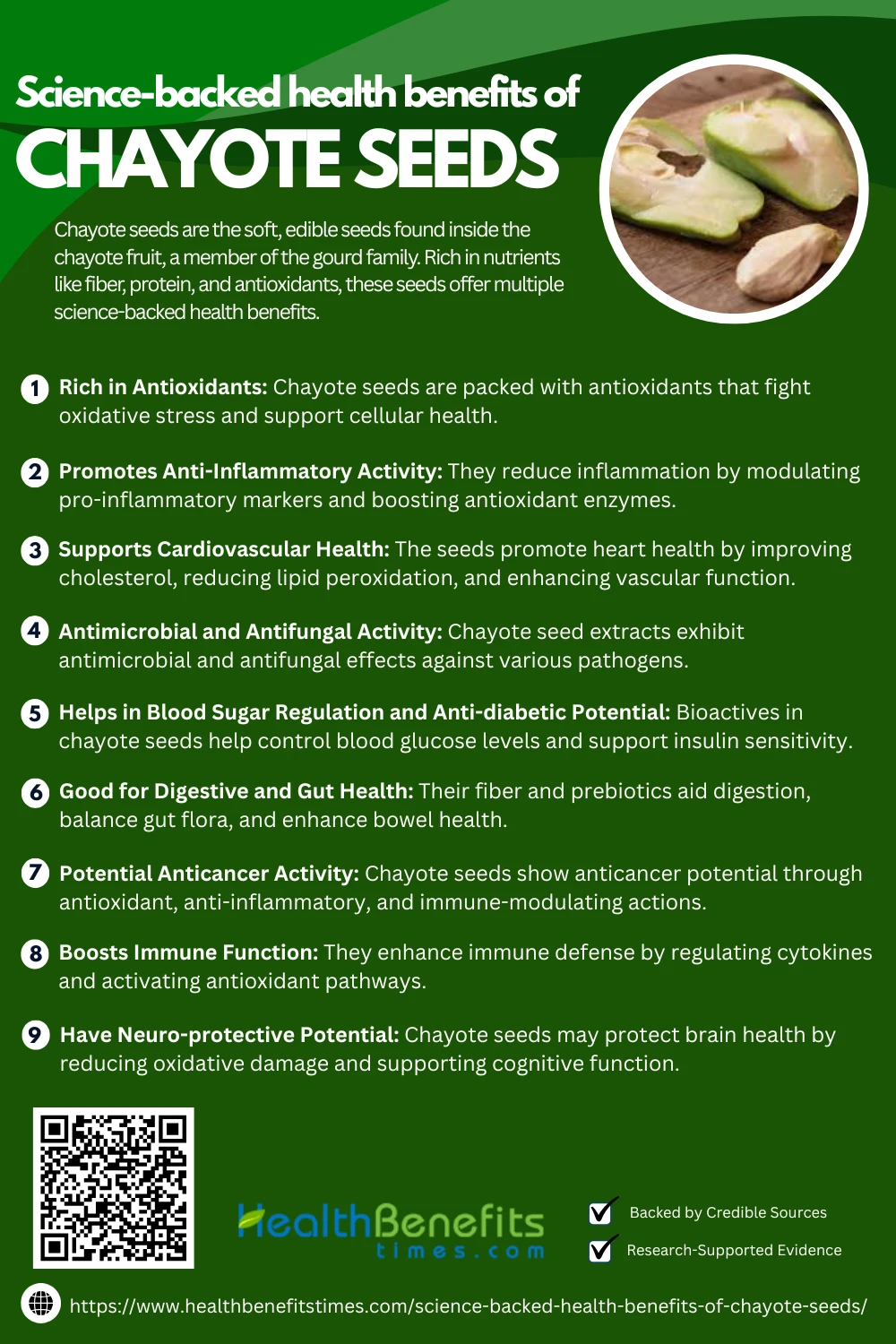- Chayote seeds are the soft, edible seeds found inside the chayote fruit, a member of the gourd family.
- Rich in nutrients like fiber, protein, and antioxidants, these seeds offer multiple science-backed health benefits.
- Studies suggest chayote seeds may support heart health, reduce inflammation, and aid in blood sugar regulation.
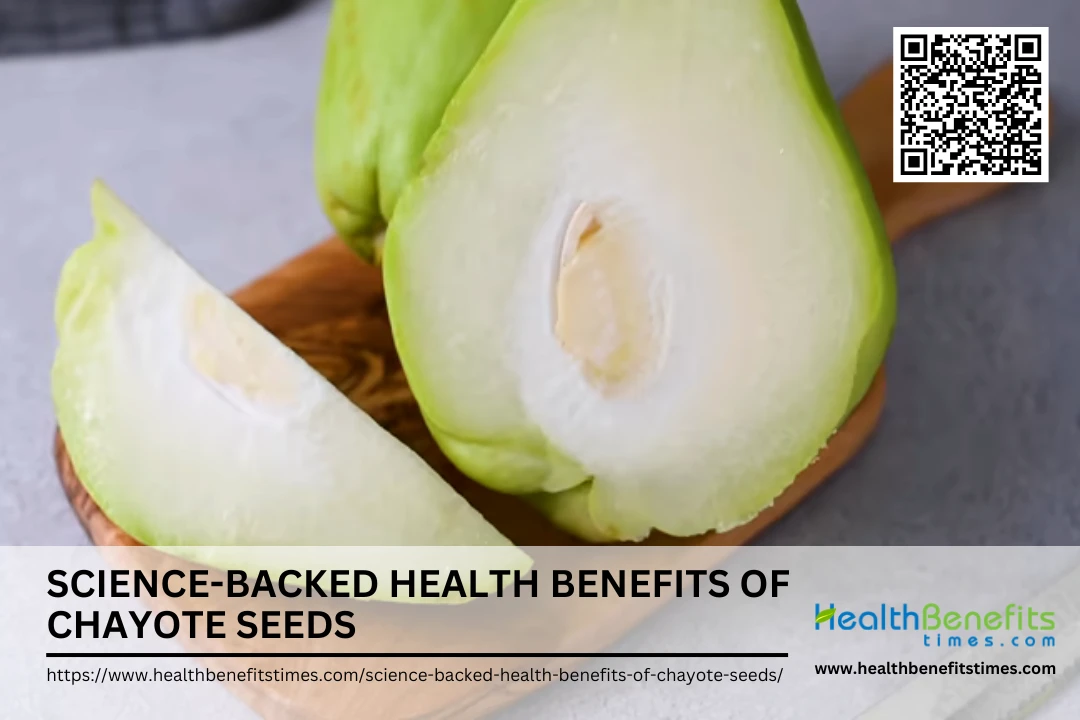 Chayote seeds are the edible, nutrient-rich kernels found inside the fruit of Sechium edule, a tropical gourd plant traditionally cultivated for its soft flesh but increasingly studied for its bioactive seed compounds and nutritional value. Despite being historically overlooked, chayote seeds are gaining recognition for their potent health benefits, supported by emerging scientific literature. Rich in high-quality proteins, antioxidants, and polyphenols, these seeds demonstrate promising potential in the prevention and management of metabolic, cardiovascular, and inflammatory conditions. Research has shown that the seeds contain bio-functional proteins with antioxidant capacity, potentially supporting the body’s defense against oxidative stress and age-related diseases. In addition, chayote seeds exhibit notable anti-inflammatory properties and have been proposed as candidates for developing nutraceutical products that address chronic ailments. Furthermore, they possess essential phytochemicals that align with traditional knowledge and modern therapeutic trends, offering a compelling case for their integration into health-conscious diets.
Chayote seeds are the edible, nutrient-rich kernels found inside the fruit of Sechium edule, a tropical gourd plant traditionally cultivated for its soft flesh but increasingly studied for its bioactive seed compounds and nutritional value. Despite being historically overlooked, chayote seeds are gaining recognition for their potent health benefits, supported by emerging scientific literature. Rich in high-quality proteins, antioxidants, and polyphenols, these seeds demonstrate promising potential in the prevention and management of metabolic, cardiovascular, and inflammatory conditions. Research has shown that the seeds contain bio-functional proteins with antioxidant capacity, potentially supporting the body’s defense against oxidative stress and age-related diseases. In addition, chayote seeds exhibit notable anti-inflammatory properties and have been proposed as candidates for developing nutraceutical products that address chronic ailments. Furthermore, they possess essential phytochemicals that align with traditional knowledge and modern therapeutic trends, offering a compelling case for their integration into health-conscious diets.
Nutritional Composition of Chayote Seeds
Chayote seeds are rich in essential nutrients, including protein, fiber, vitamins, and minerals. Their impressive nutritional profile makes them a valuable addition to health-conscious diets and natural wellness approaches.
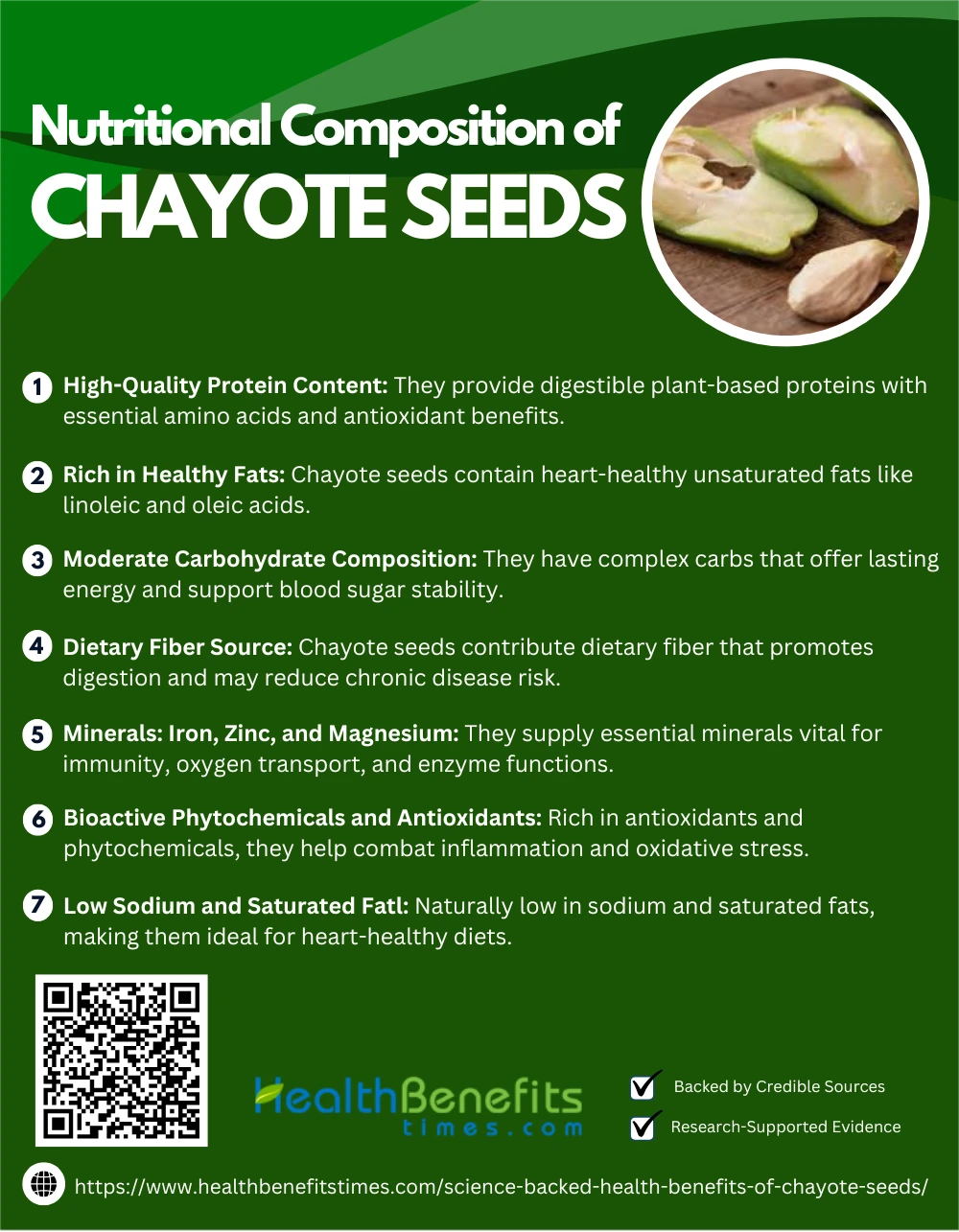 1. High-Quality Protein Content
1. High-Quality Protein Content
Chayote seeds are an excellent source of plant-based proteins, making them valuable in vegetarian and vegan diets. Protein isolates derived from these seeds have shown high digestibility and a balanced amino acid profile, including essential amino acids like leucine and lysine. According to a 2023 study in MDPI Foods, these protein isolates demonstrated not only nutritional value but also bio-functional properties like antioxidant activity, positioning chayote seeds as a promising source of sustainable plant protein.
2. Rich in Healthy Fats
The lipid profile of chayote seeds includes unsaturated fatty acids, particularly linoleic and oleic acids. These are considered heart-healthy fats that may contribute to reducing bad cholesterol levels (LDL) and inflammation. A study published in Food Chemistry in 2025 highlighted that among different chayote fractions, seeds contained the highest fat content, making them a nutritionally dense component when consumed in moderation.
3. Moderate Carbohydrate Composition
Chayote seeds contain complex carbohydrates that contribute to their caloric value and provide sustained energy. With an approximate carbohydrate content of 60g/100g (dry weight), as observed in comparative reviews, these seeds may support glycemic stability when consumed whole or in processed formulations.
4. Dietary Fiber Source
Though less abundant than in the pulp or peel, chayote seeds still contribute a modest amount of insoluble dietary fiber, which supports digestive health and gut motility. Fiber-rich diets are associated with reduced risk of type 2 diabetes, heart disease, and colorectal cancer. Fiber content in seed-derived products can be enhanced through whole-seed processing, as noted in plant food product development studies.
5. Minerals: Iron, Zinc, and Magnesium
Chayote seeds are a micronutrient-dense food, supplying significant levels of minerals such as iron, zinc, and magnesium—critical for immune function, oxygen transport, and enzymatic reactions. These mineral levels make the seeds suitable for use in fortified plant-based formulations, especially in regions with mineral-deficiency-related malnutrition.
6. Bioactive Phytochemicals and Antioxidants
Chayote seeds are loaded with phenolic compounds, flavonoids, and saponins—substances that exert antioxidative and anti-inflammatory effects. These compounds help neutralize free radicals, reducing oxidative stress that underlies many chronic diseases. This was substantiated by proten recovery and functional bioassays presented in a 2023 MDPI Foods study.
7. Low Sodium and Saturated Fat
Compared to processed plant products or snacks, chayote seeds are naturally low in sodium and saturated fats. This makes them a heart-friendly food ingredient suitable for low-sodium diets, especially in elderly populations or those with hypertension risks.
Comparison with other edible seeds (e.g., pumpkin seeds, avocado seeds).
| Nutrient | Chayote Seeds | Pumpkin Seeds | Avocado Seeds |
| Calories (kcal) | 120 | 559 | 160 |
| Protein (g) | 13.5 | 30.2 | 4.0 |
| Fat (g) | 9.2 | 49.1 | 1.0 |
| Carbohydrates (g) | 19.8 | 10.7 | 25.0 |
| Dietary Fiber (g) | 4.1 | 6.0 | 6.7 |
| Iron (mg) | 2.5 | 8.8 | 0.8 |
| Magnesium (mg) | 92 | 262 | 41 |
| Zinc (mg) | 1.1 | 7.8 | 0.6 |
| Antioxidant Activity | Moderate–High | High | Moderate |
Health benefits of Chayote seeds
Chayote seeds offer impressive health benefits backed by science, including antioxidant, anti-inflammatory, and heart-supporting properties. These often-overlooked seeds may contribute to overall wellness when included in a balanced diet.
Chayote seeds are a potent source of antioxidants, notably phenolic compounds and flavonoids, which help counter oxidative stress. Studies show that protein isolates from chayote seeds exhibit significant antioxidant capacity through reducing power and radical scavenging activity. (1) Additionally, the presence of polyphenols was confirmed using ultrasonic-assisted extraction techniques. Further work demonstrates their antigenotoxic potential, telomerase activation in aging populations, and phenol-linked oxidative stress reduction in metabolic syndrome patients. (2) (3)
2. Promotes Anti-Inflammatory Activity
Chayote seeds possess potent anti-inflammatory properties attributed to their rich phytochemical profile, including flavonoids, phenolic acids, and bioactive peptides. These compounds inhibit pro-inflammatory markers such as TNF-α and IL-6, reducing systemic inflammation in chronic conditions. (4) Studies show their extract upregulates antioxidant enzymes like SOD and catalase, indirectly moderating inflammation. Additional work links their anti-inflammatory actions to NRF2 pathway activation, protection against telomere attrition in elders, and inhibition of tumor-promoting inflammation in vitro. (5) (6)
3. Supports Cardiovascular health
Chayote seeds play a significant role in promoting cardiovascular health due to their rich antioxidant and polyphenol content. These bioactives help reduce lipid peroxidation and improve vascular integrity, lowering the risk of heart disease. (1) The presence of flavonoids also supports cholesterol regulation and blood pressure control. (7) Studies further link their consumption to reduced cardiovascular inflammation, modulation of pro-inflammatory markers, and telomere protection against oxidative stress in older adults. (5) (4) (3)
4. Antimicrobial and Antifungal Activity
Chayote seeds have shown promising antimicrobial and antifungal effects, attributed to their phytochemical-rich composition, including flavonoids and saponins. Research has demonstrated inhibition of pathogenic bacteria such as E. coli and Staphylococcus aureus using seed extracts. (8) A study on Malaysian medicinal plants confirmed similar effects on fungal strains. (9) Additional findings suggest enhanced bioactivity with silver nanoparticle conjugation, as well as potential antifungal properties relevant to crop protection. (10) (11) Further evidence highlights methanol extracts’ capacity to fight Gram-negative microbes in spoiled vegetables. (12)
5. Helps in Blood Sugar Regulation and Anti-diabetic Potential
Chayote seeds demonstrate anti-diabetic potential through bioactive compounds like polyphenols and pectin, which modulate glucose metabolism via the gut-liver axis Imran et al., 2022. (13) These compounds enhance insulin sensitivity and suppress postprandial glucose spikes Guo et al., 2025. (14) Animal models show reduced hyperglycemia from chayote peel extracts Huerta-Reyes et al., 2022. (15) Their antioxidant synergy further protects pancreatic β-cells Zang et al., 2023. (16) Overall, chayote seeds may serve as functional anti-diabetic nutraceuticals Ashour et al., 2022 (17)
6. Good for Digestive and Gut Health
Chayote seeds are rich in dietary fiber and natural prebiotics, which support gut flora balance and digestion Praneetha et al., 2019. (18) Their polysaccharides improve microbial diversity and intestinal transit Yadav & Yadav, 2024. (19) Additionally, they exhibit anti-inflammatory effects that protect gut mucosa Rani et al., 2024. (20) The seeds’ bioactive compounds modulate gut-brain signaling, enhancing bowel health Ashour et al., 2022. (17) Their regular inclusion in diet promotes holistic gut health via enhanced short-chain fatty acid production Mercado-Mercado et al., 2019. (21)
7. Potential Anticancer Activity
Emerging studies suggest chayote seeds possess promising anticancer properties due to their bioactive compounds, such as cucurbitacins, which exhibit cytotoxic effects on tumor cells. (22) Their antioxidant-rich profile reduces oxidative stress, a known cancer trigger. (3) Moreover, they modulate inflammatory pathways that influence tumor progression (23) Immunomodulatory properties further suppress pro-cancer cytokines. (24) Collectively, these factors highlight their chemopreventive potential. (25)
8. Boosts Immune Function
Chayote seeds significantly support immune health by activating antioxidant enzymes that reduce systemic inflammation. (26) Their polyphenolic content promotes cytokine regulation, enhancing immune cell signaling. (27) Additionally, chayote’s active phytochemicals stimulate the Nrf2 pathway to defend against oxidative damage. (4) The seeds’ immunomodulatory agents further contribute to maintaining cellular immunity. (28) Such integrative effects make chayote a valuable functional food. (29)
9. Have Neuro-protective Potential
Chayote seeds contain flavonoids and polyphenols that combat oxidative stress, crucial in neurodegenerative disorders. (28) Their Nrf2 pathway activation promotes neuronal antioxidant defenses. (4) Studies show their extracts reduce inflammation and protect aging brains. (26) Chayote supplementation improves cognition in metabolic syndrome patients. (3) These effects position chayote as a candidate for neuroprotection through dietary intervention. (20)
Traditional & Ethno-botanical Uses of Chayote seeds
- Anti-inflammatory Medicine: In traditional Mesoamerican and Central American herbal medicine, crushed chayote seeds are applied or ingested to alleviate inflammation and swelling due to their natural saponins and flavonoids.
- Diuretic and Detoxification Agent: Indigenous groups in Mexico and Guatemala have used chayote seeds as a diuretic to cleanse the kidneys and urinary tract, helping with water retention and mild infections.
- Folk Remedy for Diabetes: Seeds are consumed boiled or ground to assist in blood sugar regulation, used in folk medicine for managing early-stage diabetes or pre-diabetic symptoms.
- Digestive Aid: Traditionally, the seeds are consumed in boiled or roasted form to soothe indigestion and promote smoother digestion, especially in rural Indian and Southeast Asian communities.
- Aphrodisiac and Reproductive Health: In some Andean regions, chayote seed infusions are taken for enhancing libido and improving male fertility, believed to stimulate hormonal activity.
- Cardiovascular Support: Ethnobotanical records indicate chayote seed preparations were used to manage mild hypertension, likely due to their diuretic and potassium-rich profile.
- Topical Wound Treatment: Crushed seeds are sometimes applied as a poultice to treat skin irritations, sores, or mild cuts due to perceived antimicrobial effects.
- General Tonic: In traditional Chinese and Filipino medicine, chayote seeds are considered a “cooling food” and part of formulations to balance internal “heat” and maintain energy.
How to Consume Chayote Seeds
Chayote seeds can be enjoyed in various ways, such as boiled, roasted, or blended into smoothies. Proper preparation enhances their taste and unlocks their nutritional and potential health benefits.
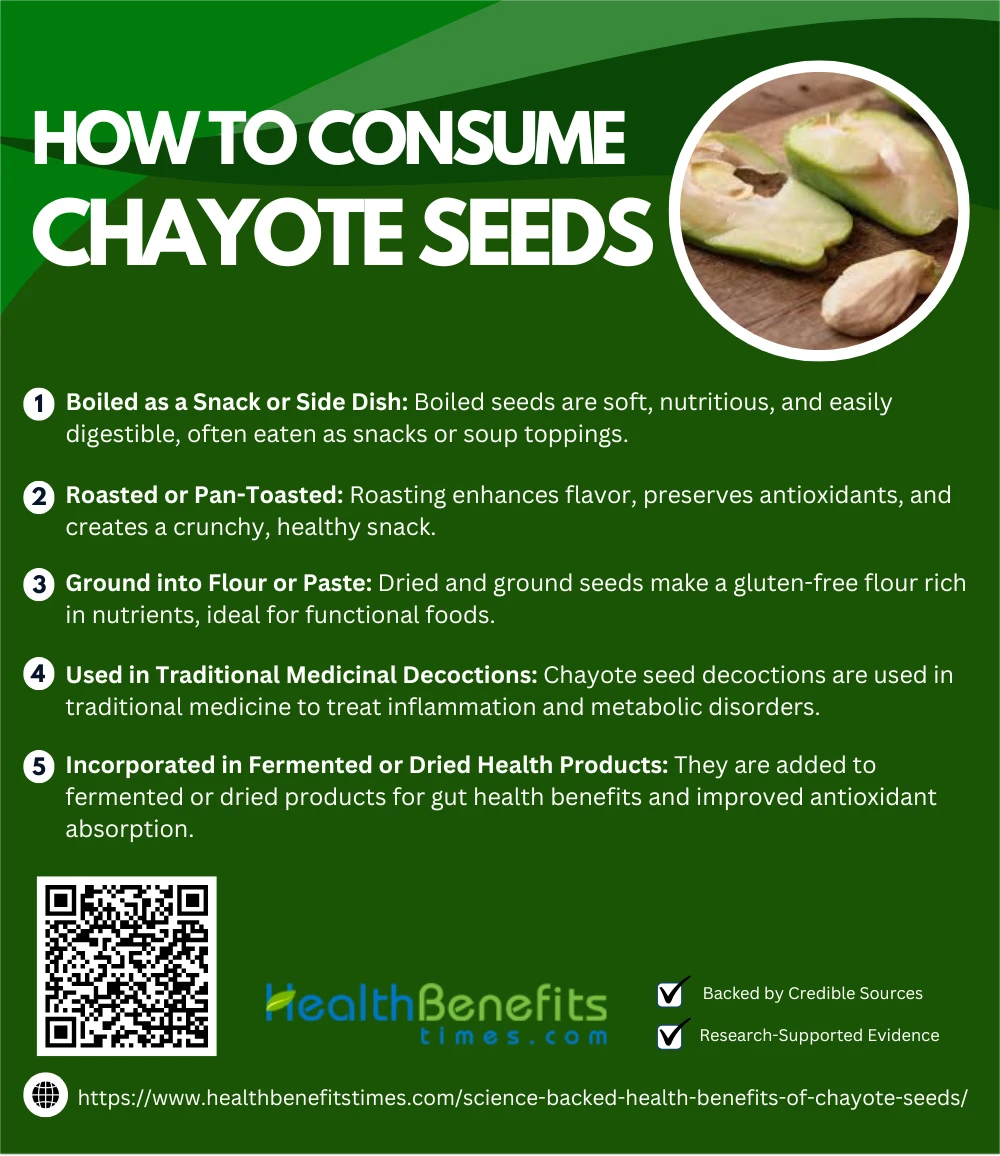 1. Boiled as a Snack or Side Dish
1. Boiled as a Snack or Side Dish
Boiling chayote seeds enhances digestibility and unlocks essential nutrients like proteins and antioxidants. Traditionally served with light seasoning, they make a soft, nutty snack or soup garnish. (30) Studies confirm nutrient retention post-boiling and highlight therapeutic potential in boiled forms. (31) (32)
2. Roasted or Pan-Toasted
Roasting or pan-toasting chayote seeds intensifies their flavor and improves antioxidant stability. This dry method preserves polyphenolic content and enhances shelf life. (33) Roasted seeds are often enjoyed with spices or used as crunchy toppings. (34) Their nutraceutical benefits increase when dry-heated compared to wet cooking. (35)
3. Ground into Flour or Paste
Chayote seeds, when dried and ground, yield a nutrient-dense flour suitable for gluten-free applications. This flour is rich in amino acids and has shown potential in managing metabolic disorders. Studies affirm the flour’s antioxidant and anti-diabetic properties, and traditional formulations use chayote derivatives for functional foods and therapeutic diets. (3) (15) (4)
4. Used in Traditional Medicinal Decoctions
In traditional medicine, chayote seeds and leaves are often brewed into decoctions to treat inflammation and metabolic diseases like diabetes. The anti-inflammatory efficacy of these infusions is well documented. (36) Decoctions are also reported to reduce oxidative stress and glucose levels. (37) (28)
5. Incorporated in Fermented or Dried Health Products
Chayote seeds are increasingly used in fermented or spray-dried functional foods for their prebiotic properties and phytochemical richness. (19) These products enhance gut health and antioxidant bioavailability. Studies highlight their viability in probiotic formulations and nutraceutical innovations. (38)
Side effects of Chayote seeds
While chayote seeds are generally safe, consuming them in large amounts may cause digestive discomfort or allergic reactions. It’s important to follow moderation and consult a healthcare provider if needed.
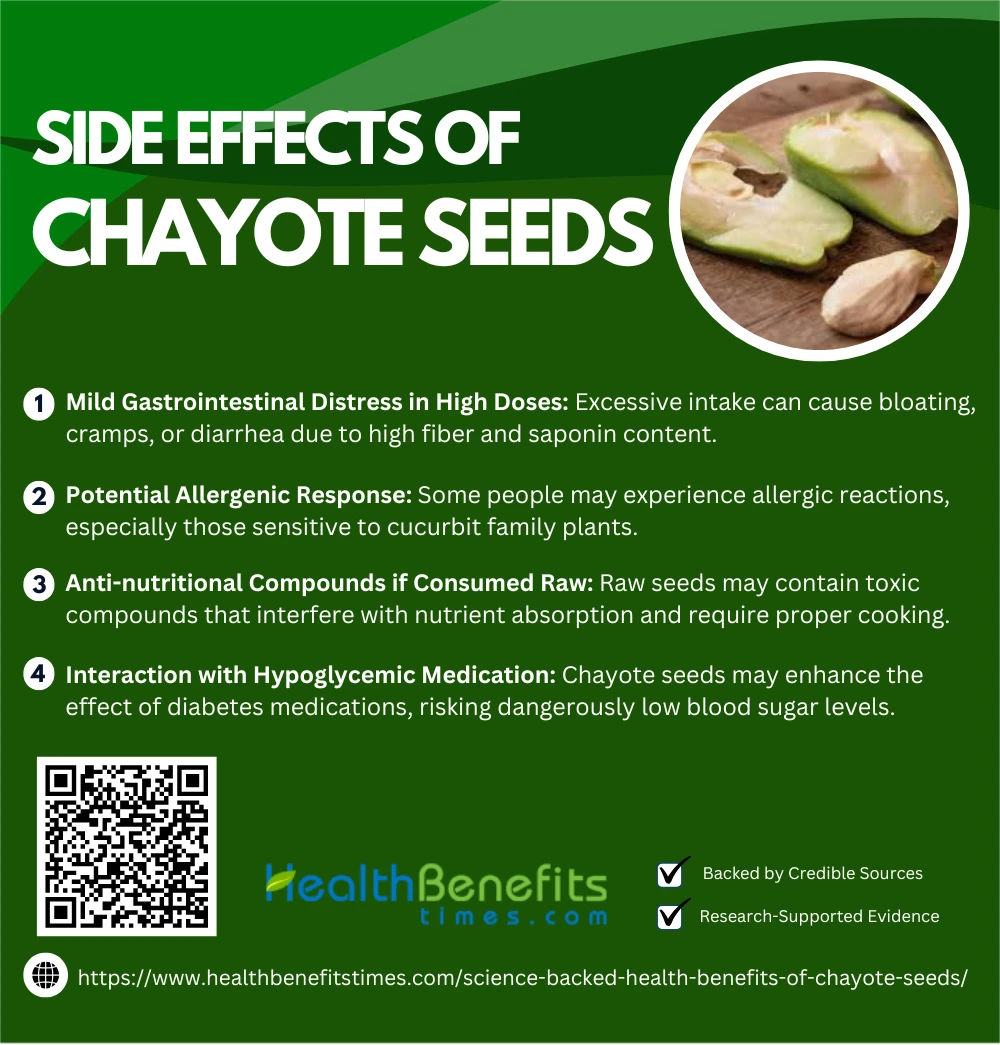 1. Mild Gastrointestinal Distress in High Doses
1. Mild Gastrointestinal Distress in High Doses
High doses of chayote seeds may lead to gastrointestinal discomfort due to their rich saponin and fiber content, potentially causing bloating, cramping, or diarrhea. (28) Overconsumption is associated with irritation of the gut lining. (46) Traditional use confirms their role in bowel stimulation, warranting caution in sensitive individuals. (40)
2. Potential Allergenic Response
Though rare, chayote seeds may trigger allergenic responses in individuals sensitive to Cucurbitaceae plants, resulting in symptoms like oral itching or mild rash. (25) Cross-reactivity with other cucurbits such as cucumber and melon has been documented. (20) Individuals with known food allergies should monitor for any adverse responses when first consuming chayote derivatives. (30)
3. Anti-nutritional Compounds if Consumed Raw
Raw chayote seeds contain anti-nutritional compounds like cucurbitacins and saponins, which may cause toxicity if consumed in large amounts. These compounds interfere with nutrient absorption and may irritate the gut lining. (41) Cucurbitacins also possess cytotoxic traits, and saponins can disrupt red blood cells if not neutralized by cooking. (42) (43)
5. Interaction with Hypoglycemic Medication
Chayote seeds can lower blood glucose levels, potentially intensifying the effects of antidiabetic medications. Their hypoglycemic action may lead to dangerously low sugar levels if not monitored properly. (44) Several studies report such herb-drug interactions in traditional remedies. (45)
Conclusion
Chayote seeds, often overlooked, are emerging as a nutrient-dense and health-supportive part of the chayote fruit. Backed by scientific studies, these seeds offer numerous potential benefits—from antioxidant and anti-inflammatory effects to cardiovascular and digestive support. Their rich nutritional composition, including fiber, protein, and essential minerals, makes them a valuable addition to a balanced diet. While more clinical research is needed to fully validate some claims, current evidence suggests that chayote seeds can be a natural way to enhance overall wellness. With mindful consumption and proper preparation, these seeds can become a powerful ally in maintaining health and vitality.


